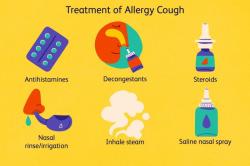How to treat dry cough naturally at home and medicinally?
Natural Treatments for Dry Cough at Home:
Hydration:
- Drink plenty of fluids, such as water, herbal teas, and broths. Hydration helps soothe the throat and keeps mucous membranes moist.
Honey and Warm Water:
- Mix a teaspoon of honey in warm water or herbal tea. Honey has natural soothing properties that can help relieve a dry cough.
Ginger Tea:
- Prepare ginger tea by steeping fresh ginger slices in hot water. Ginger has anti-inflammatory properties that may help alleviate cough symptoms.
Steam Inhalation:
- Inhale steam from a bowl of hot water. You can add a few drops of eucalyptus oil to the water to help ease congestion and soothe the throat.
Humidifier:
- Use a humidifier in your room to add moisture to the air. This can be especially helpful at night to prevent a dry throat.
Saltwater Gargle:
- Gargle with warm saltwater to help soothe an irritated throat. Mix a teaspoon of salt in a glass of warm water.
Throat Lozenges or Hard Candy:
- Sucking on throat lozenges or hard candy can stimulate saliva production and soothe a dry, scratchy throat.
Rest:
- Ensure you get enough rest to allow your body to recover. A well-rested immune system is better equipped to fight off infections.
Medicinal Treatments:
Cough Syrups:
- Over-the-counter cough syrups containing dextromethorphan can help suppress coughing. Choose a product that matches your specific symptoms (dry cough, wet cough, etc.).
Decongestants:
- Decongestants can help relieve nasal congestion that may be contributing to your cough. They are available in both oral and nasal spray forms.
Expectorants:
- Expectorants can help loosen mucus, making it easier to cough up. Guaifenesin is a common expectorant found in many over-the-counter cough medications.
Antihistamines:
- If your cough is related to allergies, antihistamines can help reduce symptoms and alleviate coughing.
Bronchodilators:
- For coughs related to bronchospasm or asthma, bronchodilators may be prescribed to help open the airways.
Prescription Medications:
- If your dry cough is a symptom of an underlying condition, such as GERD or postnasal drip, your doctor may prescribe medications to address the root cause.
Antibiotics (if bacterial infection):
- If your dry cough is caused by a bacterial infection, such as bronchitis, your doctor may prescribe antibiotics.
When to Seek Medical Attention:
- If your cough persists for more than a few weeks.
- If you experience severe chest pain, difficulty breathing, or coughing up blood.
- If you have other concerning symptoms, such as persistent fever or unintentional weight loss.
Always consult with a healthcare professional before starting any new medication, especially if you have underlying health conditions or are taking other medications. Additionally, individual responses to treatments may vary, so it's essential to tailor interventions based on your specific situation.
What are effective natural and medicinal remedies for treating dry cough at home?
While there is no cure for a dry cough, many natural and medicinal remedies can help you find relief and soothe the irritation. Here are some effective options to consider:
Natural Remedies:
- Hydration: Drinking plenty of fluids, especially water, helps loosen mucus and soothe a dry throat. Aim for at least eight glasses of water per day.
- Honey: Honey is a natural demulcent, which means it coats and soothes irritated throat tissues. Add a teaspoon of honey to warm water or tea for a comforting and soothing drink.
- Ginger: Ginger has anti-inflammatory and expectorant properties, which can help reduce inflammation and loosen mucus. You can drink ginger tea, chew on pieces of raw ginger, or add it to your cooking.
- Marshmallow root: Marshmallow root is a natural mucilage, which means it forms a gel-like substance that coats and soothes the throat. You can drink marshmallow root tea or take it in capsule form.
- Slippery elm: Similar to marshmallow root, slippery elm is a demulcent that can soothe a dry throat. You can drink slippery elm tea or take it in lozenge form.
- Saltwater gargling: Gargling with warm salt water can help loosen mucus and reduce inflammation in the throat. Mix a teaspoon of salt with eight ounces of warm water and gargle several times a day.
- Steam inhalation: Breathing in moist air can help loosen mucus and soothe a dry cough. Take a hot shower or use a humidifier to add moisture to the air. You can also inhale steam from a bowl of hot water by placing a towel over your head.
Medicinal Remedies:
- Cough drops: Cough drops can help soothe a dry throat and suppress the cough reflex. Look for cough drops that contain menthol or dextromethorphan (DM).
- Decongestants: Decongestants can help reduce swelling in the nasal passages, which can make coughing easier. However, decongestants should be used with caution, as they can have side effects such as insomnia and increased blood pressure.
- Expectorants: Expectorants help loosen mucus so that it can be coughed up more easily. Guaifenesin is a common expectorant found in many over-the-counter cough and cold medications.
Additional Tips:
- Get plenty of rest: Your body needs time to heal, so make sure you get enough sleep.
- Avoid irritants: Smoke, dust, and other irritants can worsen a dry cough. Try to avoid them as much as possible.
- Use a humidifier: A humidifier can help add moisture to the air, which can soothe a dry throat and cough.
- See a doctor: If your dry cough is severe or does not improve after a week, see your doctor. They can rule out any underlying medical conditions and recommend additional treatment options.
It's important to note that natural and medicinal remedies may not be effective for everyone. If you are pregnant, breastfeeding, or have any underlying medical conditions, it is important to talk to your doctor before trying any new remedies.












